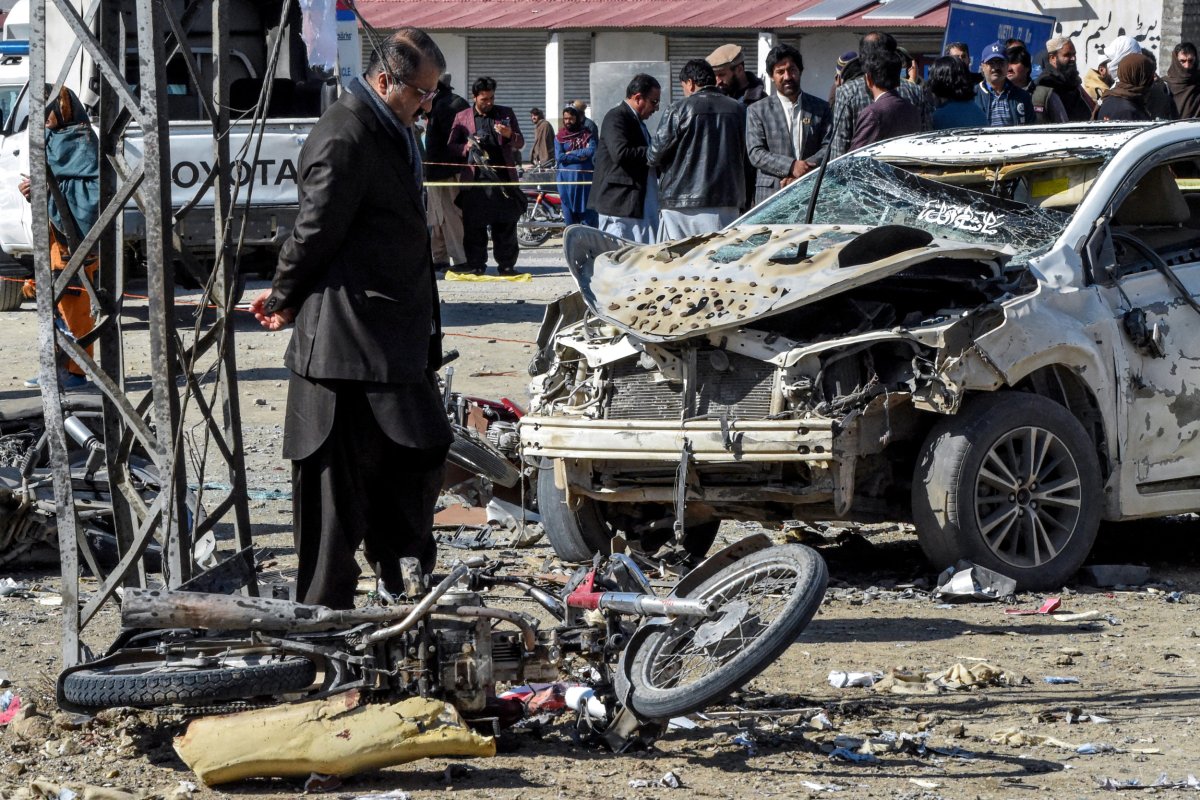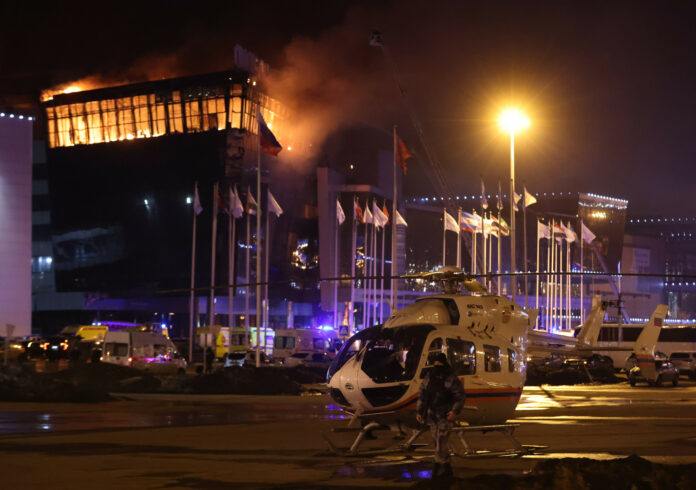With much of international attention gripped by the ongoing war in the Gaza Strip, the Islamic State militant group (ISIS) has been steadily ramping up operations across continents and setting the stage for a resurgence of global mayhem.
This latent threat came to life on Friday with ISIS claiming responsibility for a massacre targeting a concert held at Crocus City Hall outside of Moscow. It marked the deadliest militant attack on Russian soil since the 2002 theater hostage crisis in the capital. Experts and officials warn the next operation could target virtually anyone, including U.S. citizens.
Just one day before the attack, U.S. Central Command chief General Michael Kurilla told lawmakers in Congress that “ISIS-Khorasan retains the capability and the will to attack U.S. and Western interests abroad in as little as six months with little to no warning.” Weeks earlier, the U.S. Embassy in Moscow had urged U.S. nationals to avoid crowded events, “to include concerts.”
The latest attack has reclaimed international attention for the jihadis that, at their peak just a decade ago, presided over a self-styled caliphate spanning the size of Portugal. However, the roots of ISIS’ attempted resurgence have been taking hold for some time.
The group’s so-called Khorasan province (ISIS-K or ISKP) has been particularly active in its base country of Afghanistan, using the Taliban-held nation to launch attacks at home and against neighboring Iran and Pakistan, in spite of efforts by all three governments. The militants also began expanding operations beyond the region, with Russia, Germany, Turkey and Tajikistan recently cracking down on alleged ISIS-K plots.
“The recent spike in ISIS-K’s activity in the region is not an overnight development,” Amira Jadoon, a professor at South Carolina’s Clemson University who has regularly engaged with the U.S. government on issues of counterterrorism, told Newsweek, “but rather something that ISIS-K has been planning through a multi-pronged approach since a few years.”
Getty Images
From France to China and Beyond
ISIS has never been shy about its international ambitions, but its Khorasan branch has been particularly vocal in conveying preparations to expand its campaign. In an article of this month’s edition of ISIS-K’s Voice of Khurasan magazine, the group said that the “territory of Islam is never limited to Afghanistan, but it is much wider.”
“The land of Islam is the one that the Muslims gained with their sacrifices, which covers the Africa, starts from Eastern Turkestan, to Tajikistan, Uzbekistan, Azerbaijan,” the author wrote. “It extends to Chechnya and Dagestan, and from Turkey to as far as Andalus and the Middle Eastern countries, Pakistan, Afghanistan, India and so much more….”
The article went on to delineate one border of the self-proclaimed caliphate in southern France; another between Indonesia and Australia; and a third between Russia’s Turkic- and Muslim-majority neighbors in Central Asia, which have long struggled with Islamist separatists; and China’s Xinjiang region, where ISIS-K has sought to rekindle a Uyghur insurgency in support of an independent, Islamist East Turkestan.
The cover story of this particular edition of the ISIS-K publication placed a target on President Recep Tayyip Erdogan of Turkey, where the group claimed a deadly assault on a Roman Catholic church in Istanbul in late January. The previous edition prominently featured Supreme Leader Ali Khamenei of Iran, where ISIS-K claimed the deadliest attack in the 45-year history of the Islamic Republic just weeks earlier in the city of Kerman.
ISIS-K messaging has lashed out at a wide array of foes, including U.S. Presidents Donald Trump and Joe Biden, Chinese President Xi Jinping, Russian President Vladimir Putin, as well as leaders of Hamas and, especially, the Taliban, from which the group has sought to sap legitimacy and manpower.
The Graveyard of Empires
While Afghanistan may not be the extent of ISIS-K’s reach, it does appear to be the base of operations. The group first took hold in the war-torn country during its rapid rise in the neighboring Middle East a decade ago and clashed with both the U.S.-backed Afghan government and the Taliban.
By the time ISIS’ original strongholds in Iraq and Syria fell to an array of separate campaigns waged by local forces backed by a U.S.-coalition, Russia and Iran, the group had already begun laying the groundwork for a transition to focusing on Afghanistan. This country has been long referred to as “the graveyard of empires” for the history of failures that have befallen greater power invaders such as the British Empire, the Soviet Union and the United States.
When the U.S. military withdrew from its two-decade campaign in Afghanistan in August 2021, it did so with assurances that the Taliban would continue the fight against militant groups such as Al-Qaeda and ISIS. But the now-ruling Islamic Emirate has struggled to contain the spreading threat, despite an active counterinsurgency campaign.
The group saw off departing U.S. troops by conducting a suicide bombing at Kabul’s Hamid Karzai International Airport, killing 13 U.S. servicemembers and around 170 Afghan civilians. ISIS-K quickly mobilized to take advantage of its newfound maneuverability to promote a mission that, unlike that of the Taliban, extends far beyond the borders of Afghanistan.
“Following the Taliban’s takeover, ISIS-K activated its ambitious strategy of ‘internationalizing’ its agenda—which appears to have resonated directly with audiences throughout South and Central Asia but also those further afar,” Jadoon said. “This strategy is underscored by its multilingual propaganda campaign, which positioned ISIS-K as the principal regional and global antagonist to repressive regimes.”
Colin Clarke, a senior research fellow at the New York-based Soufan Center who has also frequently worked with U.S. officials on counterterrorism issues, told Newsweek he saw ISIS-K’s growing presence in Afghanistan as a key factor fueling its rise.
“The Taliban are the only counterterrorism force attempting to contain ISIS-K within Afghanistan, now that the U.S. has no presence in the country, and the Taliban is already overwhelmed with attempting to govern the entire country,” Clarke said. “The Taliban were effective insurgents; they are far less effective as a counterinsurgent force.”
Now, Clarke warned that ISIS-K poses a “significant threat” and that both its attacks and plots from the Middle East to Europe demonstrate that the group “still very much has the intent to launch attacks, along with, it seems, a growing capability to do so.”

BANARAS KHAN/AFP/Getty Images
The Kremlin and the White House in the Crosshairs
The relationship between Washington, Moscow and Islamist groups is complicated, dating back to the final acts of the Cold War. When the Soviet Union sought to save a satellite government in Afghanistan through direct military intervention in 1979, the U.S. moved to counter the Kremlin by backing a broad coalition of insurgents who would ultimately emerge victorious after a decade, with the USSR collapsing just two years later.
These mujahideen devolved into infighting that gave rise to the Taliban and Al-Qaeda. After the 9/11 attacks of 2001, orchestrated by Al-Qaeda leader and Afghan-Soviet war veteran Osama bin Laden, the U.S. would launch its longest-ever war against Afghanistan, where Al-Qaeda was being harbored by the dominant Taliban. Putin, not yet halfway through his first term in office, was the first to offer condolences to the White House over the unprecedented attack on U.S. soil.
Unlike the U.S., however, Russia’s war against Islamists has always been closer to home. Over the past three decades, Russia has waged two wars against Islamist Chechen separatists on its own territory and has sought to support allied former Soviet republics cracking down on jihadi activity in Central Asia.
Eyeing the rise of Islamist militants after U.S.-led interventions in Iraq and Libya, Moscow conducted an unprecedented foreign military intervention in support of Syrian President Bashar al-Assad against rebels, some of whom were backed by Washington, amid ISIS’ rapid spread in 2015. Both U.S. and Russian troops remain in Syria in support of opposing goals to this day, and Moscow has only doubled down on its influence in other ISIS-vulnerable areas such as the increasingly active frontlines of Africa’s Sahel region.
Owing to the clash between ISIS’ ultraconservative Islamist ideology and Putin’s traditional Russian Orthodox Christian leanings, the jihadis have long had Moscow in their sights.
“Russia has been a top priority enemy for the Islamic State since its early days,” Lucas Webber, co-founder of the Militant Wire research network, told Newsweek. “In 2014, former caliph Abu Bakr al-Baghdadi named Russia as a primary foe alongside the United States.”
“Russia has attracted the attention of IS through its military intervention in Syria and across Africa, its relations with the Taliban, and several other policies,” Webber added. “Moscow is viewed as a power center for what IS has called the ‘Crusader East.'”
An Enemy Out of Reach
While Russia is largely expected to muster up a tough reply to the militant attack in Moscow, striking at the roots of ISIS has proven an elusive challenge.
“What is clear is that the Islamic State retains the intent and capabilities to direct external operations—on a significant scale,” Webber said. “The fall of the territorial caliphate’s last vestiges in 2019 was indeed a major setback, but it is a patient organization and maintains the ability to carry out attacks and incite its supporters to violence.”
Iftikhar Firdous, founding editor of the Khorasan Diary and visiting professor at Quaid-i-Azam University in Pakistan, told Newsweek that one of ISIS-K’s most-devastating characteristics is that it “alternates periods of hyperactivity and semi-hibernation depending on a number of factors, which could be either dictated by local circumstances or influenced by global trends.”
“One of the main advantages that ISKP retains is its evident capability of building networks across different countries through individuals belonging to different ethnic communities,” Firdous said. “This is visible both on an organizational level, with attacks planned in Syria, exercised in Afghanistan, and carried out in Iran or Turkey, as well as on an individual support base, with ISKP affiliates creating informal links among them to remain in contact, travel, and ask for information.
“This transnational factor of ISKP makes it extremely difficult for countries to tackle the group’s operational capabilities,” Firdous added.
Even more dangerous have been the second order effects of ISIS-K activities in the region. The group’s activities have managed to exploit mistrust between Afghanistan, Pakistan, Iran and Tajikistan, stirring tensions among nations accusing one another of harboring militants.
With sophisticated financial networks, active propaganda campaigns spanning continents and a broad array of targets, Firdous said that perhaps the group’s greatest asset is its “unpredictability and capability to always capitalize on local dynamics, contrary to other militant groups which do possess strict guidelines.”
As such, Firdous added, “the U.S. and Western governments have limited space to counter ISKP as a whole” and “directly tackling ISKP in its own areas remains highly unlikely given the current political regional scenario, especially as it is unfolding in the first months of 2024.”
“Mutual distrust between neighboring countries would make it difficult for an integrated and genuine security cooperation between the U.S. and allies and regional governments to take place in an effective manner,” Firdous said, “beyond the mere assessment of ISKP activities on the ground.”
Uncommon Knowledge
Newsweek is committed to challenging conventional wisdom and finding connections in the search for common ground.
Newsweek is committed to challenging conventional wisdom and finding connections in the search for common ground.


